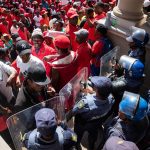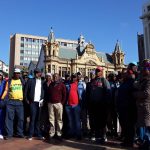Political killings on the rise in Port Elizabeth
True democracy requires the right to organise freely. But the scale of political assassinations, and the impunity with which they occur, seriously compromises democracy in South Africa.
Author:
8 July 2019

On the morning of Thursday 4 July, Bongani Cola, the deputy chairperson of the Democratic Municipal and Allied Workers Union of South Africa (Demawusa) for the Nelson Mandela Bay region, was murdered outside his home in New Brighton, Port Elizabeth, as he was preparing to leave for work. He was shot while closing his garage door. His car was left idling. His phone and wallet were not taken. Unsurprisingly, the South African Federation of Trade Unions (Saftu) have described the murder as an assassination.
Political assassinations have become a serious problem in South Africa. The fact that there is no definitive study on the scale of political assassinations in post-apartheid South Africa is indicative of the lack of seriousness with which the issue has been treated.
The information that we do have makes for bleak reading. A 2013 report estimated that there had been 447 political killings in KwaZulu-Natal since 1994. A 2017 report recorded 284 political assassinations across the country between 2000 and 2017, the majority in KwaZulu-Natal. By the end of Jacob Zuma’s presidency there was consensus that the number of assassinations had rapidly increased since 2016. A 2018 article in The New York Times reported that around 90 politicians had been assassinated as a result of intra-ANC contestation since 2016.
The bulk of the assassinations have been consequent to the criminalisation of the ruling party and intra-ANC battles over access to patronage. But the South African Communist Party (SACP) and groups organising outside of the ruling party, such as the now effectively defunct Landless People’s Movement (LPM), the National Union of Metalworkers of South Africa (Numsa), the Amadiba Crisis Committee and, of course, shack dwellers’ movement Abahlali baseMjondolo, have also been subject to assassination. Abahlali baseMjondolo has paid a particularly heavy price, in blood and lives lost, for the temerity of organising land occupations in explicit opposition to the ruling party.
Related article:
However, in the elite public sphere, the lives of impoverished and working-class black people generally count for very little. This is especially so when grassroots activists subject to assassination are working independently of middle class-run non-governmental organisations (NGOs). For this reason the scale of political violence is not generally taken to be a crisis by the mainstream media, or by many NGOs and in parliamentary politics. We’re unlikely to hear the president give a speech on this crisis.
However, the establishment in October 2016 of the Moerane Commission of Inquiry into political killings in KwaZulu-Natal, and the release of its report in September last year, did draw some national attention to the extent of the scale of political assassinations in Durban, and in KwaZulu-Natal more broadly. There has also been some attention devoted to political assassinations in Mpumalanga, particularly during the grim years of Deputy President David Mabuza’s reign as premier. But the extent of the problem in Port Elizabeth has not received serious attention.
Politics and violence
Port Elizabeth has a general problem with both the criminalisation of politics and everyday violence. Crispin Olver’s 2018 book How to Steal a City showed that “the metro was effectively controlled by a criminal network, closely allied to a dominant local ANC faction”. At the same time, gang and vigilante-related killings in the city have become increasingly common in recent years. In February, GroundUp reported that at least 13 people had been killed in vigilante violence in the previous four months.
But just as politics has been criminalised, so too has violence been politicised. Saftu estimates that more than 20 of its members have been assassinated in Port Elizabeth in recent years. While there is not currently an accurate figure for the number of assassinations in the city, it’s certainly true that in recent months reports of murders of trade unionists in Port Elizabeth have become an increasingly regular and alarming feature of the Whatsapp groups in which much union news is shared.
Demawusa, which describes itself as a revolutionary socialist union, was founded in September 2015 as a breakaway from the South African Municipal Workers’ Union (Samwu), which remains aligned to the ruling party and has been battered by an extraordinary avalanche of corruption claims.
Related article:
In Port Elizabeth, Demawusa has been making significant progress in winning over municipal workers who no longer wish to associate themselves with Samwu. According to Saftu, Cola played a key role in building the new union in Port Elizabeth. The assassination of an effective union organiser working outside of the ruling party is, of course, a blow to prospects of independent workplace organisation.
After every election, anodyne liberal commentators roll out a standard set of clichés about democracy having been “the real winner”. But democracy is not just a matter of the right to vote. It is also, among other things, the right to organise freely and independently. The ANC accedes to that right in principle but it has not granted it in practice to impoverished and working-class black people who have sought to organise themselves outside of its authority.
As the experience of organisations like the LPM and Abahlali baseMjondolo shows, this authoritarianism predates Zuma’s rise to the presidency. It is, therefore, a problem that cannot be reduced to the rapid degeneration of the ANC, and the state, during Zuma’s reign.
Instrument of control
If the political assassination of impoverished and working-class black activists received even a reasonable fraction of the media coverage devoted to corruption, there would be considerably less impunity for the turn to murder as an instrument of political control.
In the general absence of middle-class concern about the scale of political violence, it is vital that trade unions and grassroots organisations find a way to work together, and to include other progressive actors willing to respect the autonomy of popular organisations, with the aim of building a powerful bloc capable of asserting that every assassination is an outrage.
In Durban, the city in South Africa in which politics is most dangerous, Abahlali baseMjondolo has been able to secure the convictions of two ANC councillors and one police officer for the murder of their members. This success is limited as there have been no convictions for many other political murders. However, it is also significant and it does show that sustained organisation can generate, focus and sustain the political will required to effectively push back against the impunity that is generally experienced by the perpetrators of political violence.
If sustained solidarity could be built across different popular organisations at a national level, it may be possible to effectively push back against what Abahlali baseMjondolo has termed “the politics of blood”.


